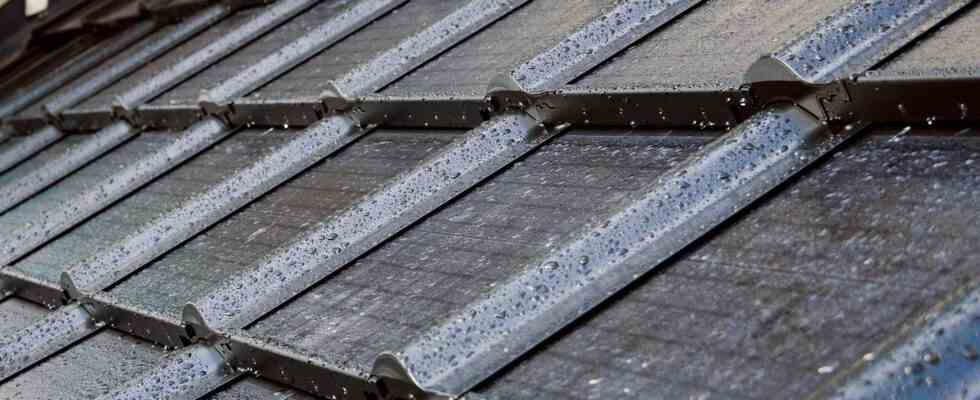Status: 02.12.2022 08:57
Compared to companies from China, the German solar industry is insignificant today. But more energy independence is the political goal. Do German manufacturers have a chance with niche products?
One day his roof tiles could supply the Federal President with electricity. This is a great recognition for Peter Hakenberg. With his company paXos from Langenfeld near Düsseldorf, he developed solar roof tiles. When the call came that the bricks could be considered for the renovation of Bellevue Palace, Hakenberg was enthusiastic: “It’s nice that we have the reputation of being asked for something like this,” he says.
Solar tiles from the manufacturer paXos on a test roof in Cologne.
Image: paXos
Suitable for listed buildings
The Federal Office for Building and Regional Planning, which is responsible for the renovation of the castle, slows down the euphoria a little. So far, only sample bricks with integrated photovoltaics have been examined: “No decision has yet been made,” the Federal Office said. However, there is an intention to convert the official residence of the Federal President to solar energy in accordance with the monument requirements.
Hackenberg’s solar roof tiles can hardly be distinguished from conventional tiles and are therefore particularly suitable for listed buildings for optical reasons: “People want to upgrade their house for solar energy, but they don’t want to spoil it,” says the engineer. Due to their small-scale shape, the solar roof tiles can also be used for crooked roofs on which large solar modules can hardly be attached.
EU manufacturers with only one percent market share
Hackenberg’s company has sold the rights to Swiss manufacturer Meyer Burger for part of its roof tile innovation – the solar roof tiles. Series production is set to begin soon, and Hakenberg expects a hundred thousand units per month from the middle of next year. The acquisition is part of Meyer Burger’s growth course; the company has production facilities in Saxony and Saxony-Anhalt, among other places. Meyer Burger is an industry giant by European standards, but a dwarf by global standards.
How insignificant the European solar industry is in international comparison is shown by data from the consulting firm PwC for 2021. In the case of solar modules, the global market share of all EU manufacturers together is just one percent. China alone, on the other hand, accounts for 75 percent of the world market.
Solar roof tiles just a “niche solution”?
Can innovations like Peter Hakenberg’s bring Germany to the top of the world solar industry? Volker Quaschning, Professor of Regenerative Energy Systems at the HTW Berlin, is skeptical and speaks of wishful thinking: “The Chinese aren’t stupid when it comes to technology and development either high,” he says.
The idea for solar roof tiles is not new, Quaschning points out, other manufacturers are already bustling about in this area. “It’s very interesting for architectural reasons, but it’s more of a niche solution,” says the solar expert. In the end, the decisive factor is the price.
Around 20 percent more expensive
In fact, Hakenberg has to admit that his roof tiles are comparatively expensive. The builder kills two birds with one stone and has roof tiles and a solar system in one. However, this combination is around 20 percent more expensive than a conventional roof and a conventional solar system taken together.
However, his roof tiles could also generate heat – and can be used so well in combination with a heat pump, says Hakenberg: “This means that you can save 25 percent of the electricity consumption with the heat pump on average over the year.”
High dependency on China
Above all, geostrategic considerations speak in favor of strengthening the German solar industry. The Federal Republic had become heavily dependent on Russia for gas supplies, and is dependent on China for solar energy. “If China invades Taiwan, the German energy transition will be over,” puts it somewhat pointedly, energy expert Quaschning. The federal government is trying to take countermeasures, Economics Minister Robert Habeck has promised state production or purchase guarantees for the green electricity industry.
It is also about rebuilding lost trust. Around ten years ago, a number of German manufacturers went to their knees because they could not keep up with the Chinese competition. German politics did not prevent this decline at the time. “That’s not a great history for companies,” says Quaschning. He calls for better framework conditions in the long term to enable the development of large European manufacturers.
Roof tile developer Hakenberg is currently experiencing a “total paradigm shift” after years of neglecting the solar industry in Germany. The German dependency is high – also for supplier parts: “Just for the production of sample goods we have to have something flown in from China every time.” So there is still a long way to go.

